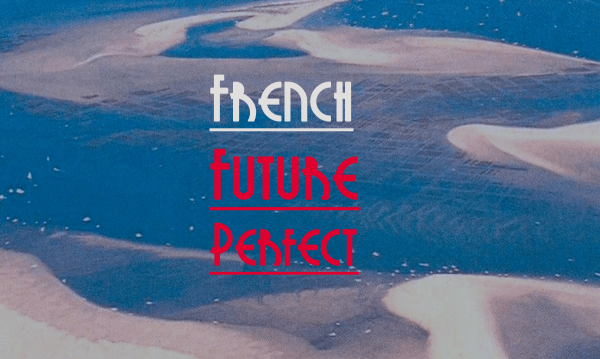Oh hello there. There’s something I want to tell you: by the time you finish reading this article, you will have familiarized yourself with the futur antérieur.
See what I did there? In case you noticed (you quick-eyed, clever little you), I just gave you a little dose of the future perfect tense.
…and you will have noticed it after going back to recheck the introduction.
…and you will have laughed at yourself when you review it once more to check what you missed.
Ha!

But let’s move on and get into the meat of the topic: the what, when, how, where, and why of the futur antérieur or the French future perfect tense.
What is the French future perfect tense?
It’s the same thing as how you use it in English: to describe or talk about an action that will have happened or will be completed in a certain time in the future.
Sounds like a bit of a contradiction, isn’t it? Well, just a little. But you probably don’t notice it too much in your daily speech.
Here’s an example.
I will have finished my work by tomorrow. J’aurai fini mon travail demain.
See?
See also: French Future Tense: Everything You Need to Know
When do you use the future perfect tense?
Aside from the examples given above, there are other uses of the future perfect tense in French which do not correspond to the English usage. Here are the three of them:
- The future perfect is used during instances when we use “must” in English. For example: Henri n'est pas ici ;il aura oublié. (Henri isn’t here; he must have forgotten.)
- When using conjunctions like quand, lorsque, aussitôt que, dès que, une fois que and après que. In English, we would simply use either a present or a past tense. For example: Nous le feron saussitôtqu'elle sera arrivée. (We’ll do it as soon as she has arrived.)
- When talking about the events of a person’s life in a historical context. In English we use the past tense or sometimes even the conditional, but in French, the future perfect is used. For example: Victor Hugo aura écrit la poésie en deux heures. (Victor Hugo wrote poetry in two hours.)
How do you form the French future perfect tense?
Forming the future perfect is simple enough; all you have to do is use the correct future tense of the auxiliary (either avoir or être) and combine it with the past participle of the verb.
In short, it is this formula:
Future tense of the auxiliary + past participle
There’s a tricky little catch though: just like other cases of compound conjugations in French, remember that the future perfect needs to agree.
- When using the auxiliary verb être, the past participle needs to agree with the SUBJECT.
- When using the auxiliary verb avoir, the past participle needs to agree with the DIRECT OBJECT.
(Too many rules? I feel ya.)
Don’t worry you’ll get the hang of it.
- Here is an example using the auxiliary verb être:
Verb: aller (to go)
| I will have gone. | je serai allé(e) |
| You will have gone. | tu seras allé(e) |
| He /She will have gone. | Il/ elle sera allé(e) |
| We will have gone. | nous serons allés(es) |
| You will have gone. | vous serez allés(es) |
| They will have gone. | Ils/elles seront allés(es) |
- Another set of examples using the auxiliary avoir.
Verb: aimer (to love)
| I will have loved. | J’aurai aimé |
| You will have loved. | Tu auras aimé |
| He/she will have loved. | Il/elle aura aimé |
| We will have loved. | Nous aurons aimé |
| You will have loved. | Vous aurez aimé |
| They will have loved. | Ils/elles auront aimé |
Where will you place the auxiliary verbs avoir or être in the French future perfect tense?
Most likely you are already familiar with this question based on previous lessons. But as a quick reminder, French verbs, when used in compound conjugations, either appear with avoir or être.
Most French verbs use avoir, but for the verbs below, the helping verb être is the one being used.
arriver – to arrive
descendre– to descend
entrer– to enter
rentrer– to reenter
monter– to climb
remonter – to climb again
naître – to be born
renaître – to be reborn
partir – to leave
repartir – to leave again
passer – to pass
rester – to stay
retourner – to return
sortir – to go out
resortir – to go out again
tomber– to fall
retomber – to fall again
venir – to come
devenir– to become
parvenir – to reach
revenir– to come back
You might notice that all the être verbs refer to some sort of movement.
And, finally…
Why do you need to learn about the French future perfect?
Let’s face it, it’s hard. Even more so when your heart isn’t in it. But why, why do you need to study this anyway?
Simple: you want to be a good French speaker, don’t you?
To be able to express yourself fully in French, you need to be familiar with the future perfect. If you are going to study French, then you might as well do it completely. Remember, doing things half-assed isn’t a cool way to learn.
Alright?
Okay.
Let me know what you think and if you have any questions in the comment section below. Cheers!
Still Stuck at Intermediate French?

Break through the plateau with our proven coaching and study method.
P.S. You would be doing me a HUGE FAVOR by sharing it via Twitter or Facebook.

You’re cool. Cool, cool, cool.
The third example (Victor Hugo aura ecrit…) is also used in historical speech in English too, much to my annoyance, when trendy historians are recounting something.
‘And Caeser looks up, seeing the Rubicon in front of him. He will have had conflicting thoughts about crossing it: yes, it will entail victory, but future generations will only be aware of it as a tired an over-used metaphorical device. Nevertheless, knowing the grass will not flatten itself, he presses on’.
For example.
thank you, I have found this difficult. I have re studied it several times now and feel hopeful, even excited; it will help me to know better how to express myself.